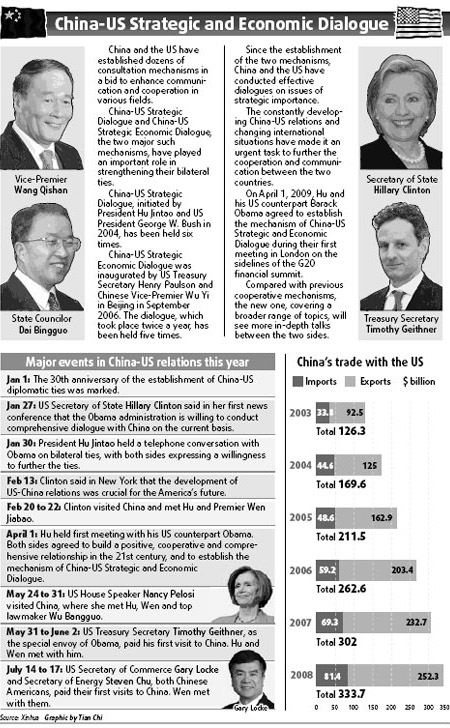
|
CHINA> National
 |
|
Trade tops agenda of China-US dialogue
By Ding Qingfen (China Daily)
Updated: 2009-07-28 07:06 If the two nations participating in the China-US Strategic and Economic Dialogue (SAED) emerge from the high-level talks with one thing, it should be an agreement to cooperate on stabilizing bilateral trade.
And if they manage to bring about that stabilization, the impact will benefit not only both economies but help the struggling global economy recover, said Wang Rongjun, a professor in the Institute of American Studies under the Chinese Academy of Social Sciences. "China and the US have never been more eager than now to push forward with bilateral trade," Wang said. "Cooperation will be the tone of the dialogue." New energy and climate change will also be among the most important topics up for discussion at the SAED sessions that were set for yesterday and today, say experts.
In terms of trade and investment, delegates are likely to talk about protectionism, the opening and enlarging of investment in both countries' economies and the idea of seeing China join the government procurement agreement under the World Trade Organization. "Progress will be made anyway both will seek possible ways to assist each other in preventing trade from further sliding," Wang said. The US has been greatly concerned about narrowing the trade gap with China. Although the Chinese trade surplus with the US is reduced this year, the US said it will emphasize that "China cannot rely on exports to the US" and that it needs to turn to "domestic consumption" for economic improvement. The US also plans to press Beijing to transform its domestic economic structure. Chinese economists said the US is hoping to gain from booming domestic consumption in China, reducing the high jobless rate. They have said they believe China is well on track to boost domestic consumption, but they do not believe China should play such an important role in bringing the US out of recession. Experts believe the US will also be pressing the Chinese government to sign the government procurement agreement. "The US expects to benefit from the Chinese stimulus package, but it's hard for China to conclude that will happen in such a short period of time," said Zhou Shijian, executive director of the WTO Research Institute. Trade protectionism in the US that has hurt Chinese exports has been an increasing problem since late 2008. The latest case involves Chinese tire exports and is awaiting the attention of Obama. The Chinese delegation is expected to remind the US of the rise in protectionism, said Wang, who urged the US to end the practice in the interests of accelerating the global economic recovery. Both China and the US will hope opportunities to invest in each other's economies will increase. They have initiated talks on China-US investment agreement, but it's hard to push the deal forward, said Wang. "The US always tends to regard large-scale Chinese investment as a threat," Wang said. China and the US are one another's second-largest trading partners. In 2008, bilateral trade was worth $333.7 billion.
 |
日本久久久精品中文字幕| 亚洲AV成人无码久久精品老人 | 天堂无码在线观看| 久本草在线中文字幕亚洲欧美| 久久亚洲精品无码观看不卡| 麻豆国产精品无码视频| 国产免费无码一区二区| 久久久久精品国产亚洲AV无码| 亚洲爆乳无码专区| 久久中文字幕视频、最近更新| 中国无码人妻丰满熟妇啪啪软件| 亚洲AV日韩AV永久无码绿巨人| 国产精品无码素人福利| 亚洲精品无码永久在线观看你懂的| 18禁黄无码高潮喷水乱伦| 亚洲av综合avav中文| 国产亚洲情侣一区二区无码AV| A最近中文在线| 久久国产三级无码一区二区| 亚洲AV无码成人网站久久精品大| 无码国模国产在线无码精品国产自在久国产 | 久别的草原在线影院电影观看中文 | 色综合久久中文字幕无码| 无码精品一区二区三区免费视频| 中文字幕一精品亚洲无线一区| 玖玖资源站中文字幕在线| 无码AV中文字幕久久专区| 亚洲AV无码资源在线观看| 国产精品亚洲а∨无码播放| A级毛片无码久久精品免费| 中文字幕久久亚洲一区| 国产午夜无码片免费| 人妻无码第一区二区三区| 色婷婷久久综合中文久久蜜桃av | 免费无码国产在线观国内自拍中文字幕 | 狠狠躁夜夜躁无码中文字幕| 无码专区天天躁天天躁在线| 少妇人妻88久久中文字幕| 色婷婷久久综合中文久久蜜桃av | 免费无码国产V片在线观看| 成人无码视频97免费|